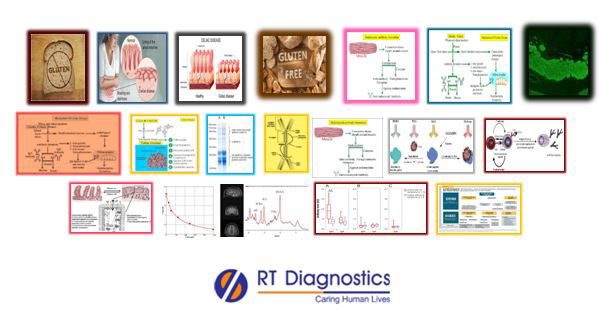Tissue Transglutaminase Antibody:
Why Tissue Transglutaminase Antibody Test?
CLINICAL INFORMATION
Tissue transglutaminase (tTG) is an enzyme (papain-like protease superfamily) that repairs damage in the body. Transglutaminases (TGases) in humans catalyse transamidation reactions. The biological role of transglutaminases is to form exclusive cross-links with generally insoluble protein polymers that provide an indispensable barrier to forming stable structures. Occasionally epidermal transglutaminases are considered predominant auto-antigen with rare HLA predisposition (positive for HLA DQ2 and/or DQ8). High levels of transglutaminases are found to be associated with certain neurological abnormalities such as Parkinson’s disease, Huntington’s disease etc. Anti-tissue transglutaminase antibodies (tTG) IgA antibody test is a screening (sensitive assay) test performed for the diagnosis of celiac disease. Celiac disease is an autoimmune disorder, where the immune system is accidentally provoked (inappropriate immune response) against a protein – Gluten (present in wheat, barley, rye, oats etc). Thus this inflammation of the small intestine due to autoantibodies results in the damage and results in the destruction of villi that line the intestinal wall. Hence may end up in malabsorption. Therefore at chronic stages, it results in Patients with Celiac disease (who elicit antibodies against gluten – “Gluten-sensitive enteropathies”), in many a case also tend to have antibodies in their blood against the enzyme transglutamase in the tissues. Other autoimmune diseases associated with the Celiac disease include dermatitis herpetiformis etc. Patients previously with the associated disorders, positive for HLA DQ2 and/or DQ8 are at high risk of developing autoimmune diseases associated with Celiac disease. Hence, such patients must screen for the presence of abnormal auto-antibodies (eg. Anti-tissue transglutaminase antibodies). Clinical manifestations with signs and symptoms include aggravation of discomfort in the gastrointestinal tract after ingestion of Gluten diet with abdominal pain (bloating sensation in the abdomen), chronic irregular bowel movements, flatulence, blood in stool, long-standing diarrhoea and also, and sometimes accompanied by extra-gastrointestinal manifestations such as chronic anaemia, fatigue, joint pain (due to calcium) and fractures, weight loss, extreme weakness, mouth ulcers, psychological disorders like depression, deficiency of IgA antibodies etc. If left untreated, Celiac disease can lead to complications such as mal-absorption of nutrients, In children – it causes stunt growth (due to loss of appetite) along with long-standing constipation and/or severe vomiting and irritability, In Pregnant women - increased risk of abortion, congenital disabilities in pregnancies and can also lead to cancer (Intestinal cancers). Usual gastrointestinal symptoms of celiac disease include IBS, abdominal pain, bloating, bowel habit abnormalities (like diarrhoea, and constipation), nausea, aerophagia, GERD, and aphthous stomatitis. Extra-intestinal symptoms include headache, migraine, foggy mind, fibromyalgia, numbness in arms and legs, tingling extremities, depression anxiety etc. Some other clinical manifestations in rare cases of celiac disease include gluten ataxia (associated with other neurological conditions appear to have a different HLA distribution) including loss of purkinji cells, gaze-evoked nystagmus and other ocular sign of cerebellar dysfunction, cerebellar ataxia, peripheral neuropathy, dermatitis herpetiformis, wheat allergy etc. Celiac disease is also usually associated with other autoimmune diseases such as Diabetes mellitus (Type-1), auto-immune thyroiditis, psoriasis, vitiligo, autoimmune hepatitis, primary sclerosing cholangitis etc. Complications of untreated celiac disease lead to mal-absorption, iron deficiency, and osteoporosis increases the risk of intestinal lymphomas and reduces the quality of life and also increases the mortality rates. Immunoglobulins (also called antibodies) are glycoprotein molecules synthesized by the plasma cells (White Blood Cells). Immunoglobulins kill the foreign pathogens through 3 different types of mechanisms, such as – neutralization, opsonization and activation of the complement system. Immunoglobulin IgA is the main antibody in the mucosal surfaces of the gastrointestinal tract, respiratory and genitourinary tract that provides the first line of defence against the invading pathogens from potential attack. Tissue transglutaminase (tTG) IgA test is used to help physicians (the most sensitive test for celiac disease) diagnose Celiac disease. Patients who tested positive for tissue transglutaminase (i.e anti-tissue transglutaminase antibodies), may also be tested positive for dermatitis herpetiformis. Patients with anti-tissue transglutaminase antibodies are likely to be affected with inflammatory disorders associated with GIT (small intestine) when exposed to Gluten – such as mucosal inflammation, villous atrophy, crypt hyperplasia etc.
Additional tests include eosinophils, IgE (allergen-specific antibodies), Human Leukocyte Antigen (markers) - HLA DQ2 and DQ8, de-amidatedgliadin peptide (anti-DGP) antibodies, gliadin IgA antibody test, endomysial antibodies, anti-reticulin antibody (ARA) test, lactose intolerance test etc. Other tests include anti-F-actin (to check the severity of intestinal damage, CBS, CRP, CMP (comprehensive metabolic panel to determine protein, electrolyte, and calcium levels to verify the status of liver and kidney), stool fat (to evaluate malabsorption), vitamin B12, folic acid, vitamin D deficiencies, iron, the iron-binding capacity of transferrin, ferritin, Biopsy- intestinal epithelial cells for histopathological tests, imaging studies etc.

General Instructions:
Sample Requirement: Specimen - Blood sample collected from the vein. Test Preparation: None.
NOTE - Sample for specimen collections may vary based on the patient’s condition/cases according to the patient’s presenting complaints/signs or symptoms:
SPECIMEN REQUIREMENT (Special or Rare Cases) - As instructed and guided by Physician / Clinician / Pathologist / as per Laboratory’s requirements, according to procedures and protocols.
This Multi-Specialty Clinical Referral Laboratory RT DIAGNOSTICS provides precise and accurate tests with an extensive range of testing services to the medical centres to help in the diagnosis and identification of pathology in the test specimens for infectious diseases and also to evaluate the function of organ systems of the patient. It prevents further complications and helps to stabilize and restore health to near normalcy at the earliest without delay.



